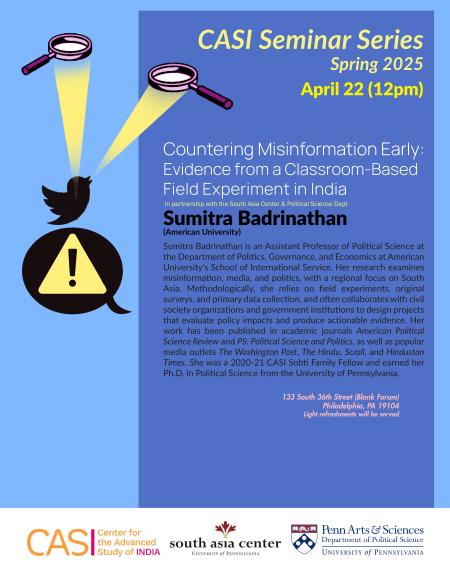Countering Misinformation Early: Evidence from a Classroom-Based Field Experiment in India
133 South 36th Street, Blank Forum (2nd Floor)
Philadelphia PA 19104-6215
About the Seminar:
Misinformation poses serious risks for democratic governance, conflict, and health. This seminar evaluates whether sustained, classroom-based education against misinformation can equip schoolchildren to become more discerning consumers of information. Partnering with a state government agency in Bihar, India, Sumitra Badrinathan et al conducted a field experiment in 583 villages with 13,500 students, using a 4-month curriculum designed to build skills, shift norms, and enhance knowledge about health misinformation. Intent-to-treat estimates demonstrate that treated respondents were significantly better at discerning true from false information, altered their health preferences, relied more on science, and reduced their dependence on unreliable news sources. She resurveyed participants four months post-intervention and found that effects persisted, as well as extended to political misinformation. Finally, she observed spillover effects within households, with parents of treated students becoming more adept at discerning information. As many countries seek long-term solutions to combat misinformation, these findings highlight the promise of sustained classroom-based education.
About the Speaker: Sumitra Badrinathan is an Assistant Professor of Political Science at the Department of Politics, Governance, and Economics at American University’s School of International Service. Her research examines misinformation, media, and politics, with a regional focus on South Asia. Methodologically, she relies on field experiments, original surveys, and primary data collection, and often collaborates with civil society organizations and government institutions to design projects that evaluate policy impacts and produce actionable evidence. Her work has been published in academic journals American Political Science Review and PS: Political Science and Politics, as well as popular media outlets The Washington Post, The Hindu, Scroll, and Hindustan Times. She was a 2020-21 CASI Sobti Family Fellow and earned her Ph.D. in Political Science from the University of Pennsylvania.
Sumitra Badrinathan is an Assistant Professor of Political Science at the Department of Politics, Governance, and Economics at American University’s School of International Service. Her research examines misinformation, media, and politics, with a regional focus on South Asia. Methodologically, she relies on field experiments, original surveys, and primary data collection, and often collaborates with civil society organizations and government institutions to design projects that evaluate policy impacts and produce actionable evidence. Her work has been published in academic journals American Political Science Review and PS: Political Science and Politics, as well as popular media outlets The Washington Post, The Hindu, Scroll, and Hindustan Times. She was a 2020-21 CASI Sobti Family Fellow and earned her Ph.D. in Political Science from the University of Pennsylvania.

